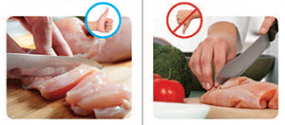Tools from Funded Partners
Explore tools from EHS-Net partners working to reduce foodborne illness and outbreaks in their communities.
Environmental Health Investigation Checklists (Minnesota Department of Health) – checklists for environmental health professionals with information on environmental assessments, characteristics of the pathogens, and pathogen-specific investigation questions

Cool Food Quick So You Don’t Get Sick! [PDF – 185 KB] (Minnesota Department of Health) – infographic on cooling times and temperatures
Food Allergies: What You Need to Know [PDF – 87 KB] (Rhode Island Department of Health) – poster for restaurants on how to handle guests with food allergies
Food Allergy Reactions [PDF – 606 KB] (Rhode Island Department of Health) – poster for restaurants on how to recognize and respond to suspected or active food allergy reactions (anaphylaxis)
Food Safety Resource Library (Rhode Island Department of Health) – posters, charts, guides, and more to help retail food establishments inform food handling employees about food safety
Foodborne Illness Outbreak Prevention infographics (New York State Department of Health) – infographics developed using New York outbreak data from local health departments about preventing foodborne illnesses, understanding how contributing factors are identified, and investigating outbreaks
Materials on Sanitation Concerns with Commercial Deli Slicers (FDA) – English and Spanish poster and flyer targeting restaurant operators, frontline restaurant staff, and food safety professionals developed as a result of Rhode Island’s environmental assessment of a Salmonella outbreak (read the success story)
Raw Chicken Training Materials for Restaurant Operators (County of San Mateo Health Services Agency) – multilingual (English, Spanish, Chinese) resources to train restaurant workers on proper handling of raw chicken to prevent foodborne illness associated with Campylobacter (read an article about these tools [PDF – 485 KB])
Assessed food safety risks associated with grocery stores
Food safety program performance assessment in Tennessee, 2003–2011
Letter grading and transparency promote restaurant food safety in New York City [PDF – 633 KB]
Machine-learned epidemiology: Real-time detection of foodborne illness at scale
Microwave cooking practices in Minnesota food service establishments
Recordkeeping practices of beef grinding activities at retail establishments [PDF – 283 KB]
Restaurant policies and practices for serving raw fish in Minnesota
Restaurant practices for cooling food in Minnesota: An intervention study
Tools and techniques to promote proper food cooling in restaurants.
Validation of a simple two-point method to assess restaurant compliance with Food Code cooling rates
Access more EHS-Net publications.
Commercial Food Equipment Standards (NSF) – new standards for commercial slicers revised in response to Rhode Island EHS-Net’s discovery that improperly designed slicers contributed to an outbreak (read the success story)
Food Code Provisions [PDF – 7 MB] (Food and Drug Administration, FDA) – model provisions on the sale of undercooked ground meat in children’s menu items (section 3-401.11(D)(2)) and on certified kitchen managers (sections 2-102.12 and 2-102.20)
Records To Be Kept by Official Establishments and Retail Stores That Grind Raw Beef Products (U.S. Department of Agriculture’s Food Safety and Inspection Service) – new rule requiring official establishments and retail stores that grind raw beef products to maintain beef grinding logs (read the success story)